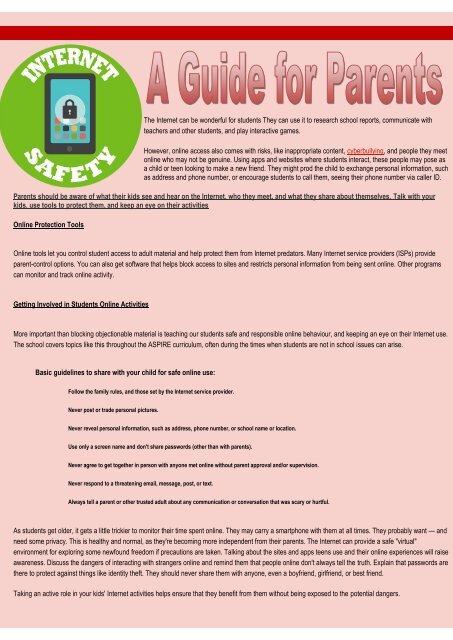20th December 2019.New
Create successful ePaper yourself
Turn your PDF publications into a flip-book with our unique Google optimized e-Paper software.
The Internet can be wonderful for students They can use it to research school reports, communicate with<br />
teachers and other students, and play interactive games.<br />
However, online access also comes with risks, like inappropriate content, cyberbullying, and people they meet<br />
online who may not be genuine. Using apps and websites where students interact, these people may pose as<br />
a child or teen looking to make a new friend. They might prod the child to exchange personal information, such<br />
as address and phone number, or encourage students to call them, seeing their phone number via caller ID.<br />
Parents should be aware of what their kids see and hear on the Internet, who they meet, and what they share about themselves. Talk with your<br />
kids, use tools to protect them, and keep an eye on their activities<br />
Online Protection Tools<br />
Online tools let you control student access to adult material and help protect them from Internet predators. Many Internet service providers (ISPs) provide<br />
parent-control options. You can also get software that helps block access to sites and restricts personal information from being sent online. Other programs<br />
can monitor and track online activity.<br />
Getting Involved in Students Online Activities<br />
More important than blocking objectionable material is teaching our students safe and responsible online behaviour, and keeping an eye on their Internet use.<br />
The school covers topics like this throughout the ASPIRE curriculum, often during the times when students are not in school issues can arise.<br />
Basic guidelines to share with your child for safe online use:<br />
Follow the family rules, and those set by the Internet service provider.<br />
Never post or trade personal pictures.<br />
Never reveal personal information, such as address, phone number, or school name or location.<br />
Use only a screen name and don't share passwords (other than with parents).<br />
Never agree to get together in person with anyone met online without parent approval and/or supervision.<br />
Never respond to a threatening email, message, post, or text.<br />
Always tell a parent or other trusted adult about any communication or conversation that was scary or hurtful.<br />
As students get older, it gets a little trickier to monitor their time spent online. They may carry a smartphone with them at all times. They probably want — and<br />
need some privacy. This is healthy and normal, as they're becoming more independent from their parents. The Internet can provide a safe "virtual"<br />
environment for exploring some newfound freedom if precautions are taken. Talking about the sites and apps teens use and their online experiences will raise<br />
awareness. Discuss the dangers of interacting with strangers online and remind them that people online don't always tell the truth. Explain that passwords are<br />
there to protect against things like identity theft. They should never share them with anyone, even a boyfriend, girlfriend, or best friend.<br />
Taking an active role in your kids' Internet activities helps ensure that they benefit from them without being exposed to the potential dangers.


















